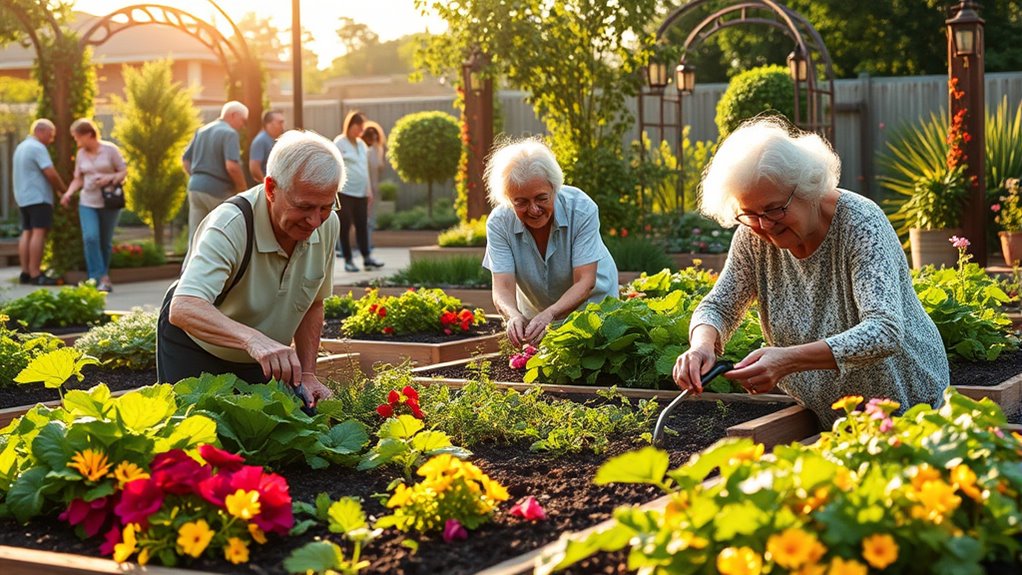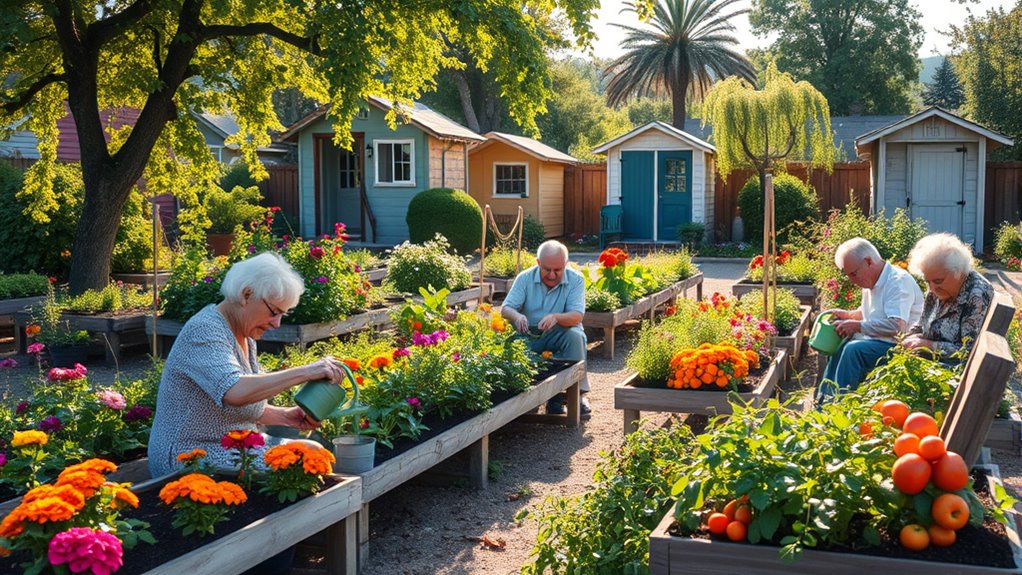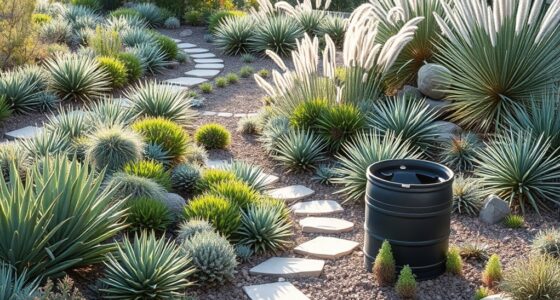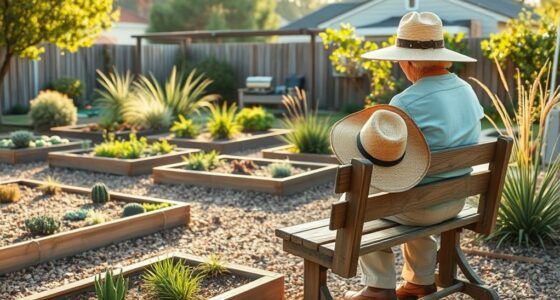Community gardening provides you with a wonderful way to stay active, connect with neighbors, and enjoy the outdoors. It offers therapeutic benefits, reduces stress, and sparks memories through hands-on activities like planting and harvesting. These gardens foster friendships, boost your self-esteem, and create a sense of belonging. By participating, you support environmental sustainability while nurturing your physical and mental health. Keep exploring to discover how these vibrant spaces can transform your senior lifestyle.
Key Takeaways
- Community gardens foster social interaction and teamwork among seniors, reducing loneliness and building friendships.
- Gardening activities provide physical exercise, mental stimulation, and a sense of accomplishment for older adults.
- Garden therapy offers calming, sensory engagement that enhances emotional well-being and mindfulness.
- Participating in sustainable gardening promotes environmental awareness and lifelong learning opportunities.
- Neighborhood transformation through community gardening creates vibrant, connected outdoor spaces beneficial for senior health.

Have you ever wondered how community gardens transform neighborhoods? These green spaces do more than just add beauty; they foster connection, promote well-being, and revitalize communities. For seniors, getting involved in community gardening offers a unique blend of physical activity, mental stimulation, and social interaction. When you participate in urban farming within these gardens, you’re engaging in more than just planting seeds—you’re cultivating a sense of purpose and belonging. Urban farming allows seniors to grow fresh vegetables and herbs right in their neighborhood, providing a rewarding experience that combines exercise with the satisfaction of nurturing life. This hands-on activity can be especially beneficial for maintaining mobility and strength, all while enjoying the outdoors.
Community gardening fosters connection, well-being, and purpose for seniors through outdoor activity and urban farming.
Garden therapy plays a significant role in how community gardening benefits seniors. It’s a form of therapeutic horticulture that focuses on the healing and calming effects of working with plants. As you tend to your garden, you’ll notice a reduction in stress and anxiety, thanks to the soothing rhythm of planting, watering, and harvesting. The sensory experience—feeling soil, smelling blooming flowers, hearing birds—can spark memories and foster mindfulness. Garden therapy isn’t just about physical activity; it’s about creating a space where seniors can reconnect with themselves and their surroundings in a peaceful, supportive environment. Many community gardens are designed with accessibility in mind, so you don’t need to worry about mobility issues hindering your participation. Incorporating vibrational alignment techniques can further enhance your overall well-being while gardening by helping you stay positive and focused. Additionally, learning about leadership skills through group projects can empower seniors to take initiative and inspire others in the community. Supporting biodiversity within the garden through native plantings can attract beneficial insects and improve ecological health, enriching your gardening experience.
Research shows that engaging in therapeutic horticulture not only benefits physical health but also fosters emotional resilience, which is crucial for aging populations. Participating in community gardening also provides an opportunity to learn about sustainable practices, promoting environmental consciousness and long-term benefits for the neighborhood. Getting involved in community gardening also leads to social opportunities that might otherwise be hard to find. Working alongside neighbors, sharing tips, or simply enjoying the sights and sounds of the garden creates a sense of camaraderie. These outdoor activities encourage conversation, teamwork, and mutual support, which are essential for emotional health as you age. Plus, participating in group gardening activities can introduce you to new friends and help combat feelings of loneliness. The sense of achievement you gain from contributing to a communal project boosts self-esteem and provides a daily dose of joy.
Ultimately, community gardening transforms neighborhoods into vibrant, connected spaces where seniors can thrive. Urban farming and garden therapy combine to create a holistic experience—one that nurtures your body, mind, and social well-being. Whether you’re planting flowers, growing your own food, or simply enjoying the act of being outdoors, these activities reinforce the idea that it’s never too late to find fulfillment in nature and community. As you dig, water, and harvest, you’ll discover that these outdoor activities become more than hobbies—they become essential parts of a healthy, happy life.
Frequently Asked Questions
How Can Seniors Start Their Own Community Garden?
If you’re interested in starting your own community garden, begin with garden planning by choosing a suitable location and deciding what to grow. Involve neighbors to build a sense of community and share responsibilities. Focus on seed selection, opting for easy-to-grow plants suited to your climate. Gather tools and resources, then organize regular workdays. With enthusiasm and teamwork, you’ll create a flourishing outdoor space that benefits everyone involved.
What Are the Safety Considerations for Elderly Gardeners?
You might worry about safety when gardening, but with proper precautions, it’s manageable. Focus on garden safety by ensuring pathways are clear and well-lit, and use tools with good ergonomics to reduce strain. Wear gloves, hats, and sunscreen, and stay hydrated. Regularly check for hazards like uneven ground or sharp tools. Taking these steps keeps your gardening experience safe, enjoyable, and rewarding, even if you’re new to it.
How Does Gardening Improve Mental Health in Seniors?
Gardening boosts your mental well-being by providing a calming, engaging activity that promotes stress relief. As you nurture plants, you focus on something positive, reducing anxiety and depressive symptoms. The physical activity involved releases endorphins, enhancing your mood. Plus, connecting with nature fosters mindfulness and a sense of accomplishment, helping you feel more relaxed and happier overall. Gardening truly supports your mental health through these natural, therapeutic benefits.
Are There Specific Plants Recommended for Senior Gardeners?
Imagine your garden bursting with vibrant, easy-to-manage plants like lavender, marigolds, and tomatoes. For you, plant selection matters—choose low-maintenance varieties that thrive with minimal fuss. Gardening tools should be lightweight and ergonomic, making planting and watering effortless. These choices help create a joyful, stress-free gardening experience, allowing you to enjoy the sights and smells without strain, nurturing both your plants and your well-being.
How Can Community Gardening Be Made Accessible for Disabled Seniors?
You can make gardening accessible for disabled seniors by incorporating adaptive tools like ergonomic tools and raised beds. Make certain pathways are wide and smooth to accommodate wheelchairs or walkers, making mobility easier. Adding seating areas and clear signage also helps. By creating an inclusive environment with accessible pathways and adaptive tools, you enable disabled seniors to enjoy gardening comfortably, fostering social interaction and physical activity.
Conclusion
As you nurture your garden, you’re planting more than just flowers and vegetables—you’re cultivating connection, hope, and purpose. Each seed you tend symbolizes growth beyond the soil, reminding you that even in later years, life continues to flourish with care and community. Your efforts bloom into a vibrant tapestry of shared moments and memories, proving that, just like a garden, your spirit can blossom endlessly when nurtured with kindness and activity.









